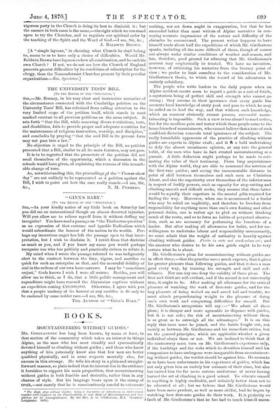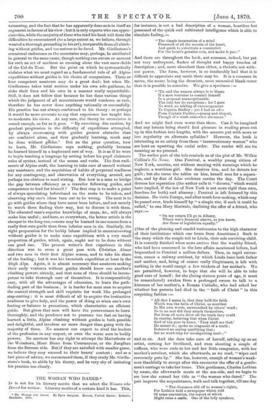BOOKS.
MOUNTAINEERING WITHOUT GUIDES.*.
MR. GIRDLESTONE has long been known, by name at least, to that section of the community which takes an interest in things Alpine, as the man who has most steadily and systematically devoted himself to climbing without guides ; and those who know anything of him personally know also that few men are better qualified physically, and in some respects mentally also, for success in this attempt. He tells his story in a plaivand straight- forward manner, so plain indeed that its interest lies in the evidence it furnishes to support his main proposition, that mountaineering without guides is both feasible and desirable, rather than in any charms of style. But his language bears upon it the stamp of ttuth,—not merely that he is conscientiously careful to extenuate * The High Alps without Guides: being a Narrative of Adventures in Switzerland, together with Chapters on the Practicability of such Mode of Mouldaineering, and Sug- gestions for its Accomplishment. By the Rev. A. G. Ginliestone, M.A. (London: Lougmems. 1870.)
nothing, nor set down aught in exaggeration, but that he has succeeded better than most writers of Alpine narrative in con- veying accurate impressions of the nature and difficulty of the obstacles he encountered. The present writer happens to have himself made about half the expeditions of which Mr. Girdlestone speaks, including all the more difficult of them, though of course not always under similar conditions of weather and season, and has, therefore, good ground for affirming that Mr. Girdlestone's account may emphatically be trusted. We have no intention, however, of criticizing his narrative from the literary point of view ; we prefer to limit ourselves to the consideration of Mr. Girdlestone's thesis, to which the record of his adventures is entirely subsidiary.
The people who write leaders in tho daily papers when an Alpine accident occurs seem to regard a guide as a sort of fetish, a mysterious being of perfect skill and strength who cannot go wrong ; they assume in their ignorance that every guide has accurate local knowledge of every peak and pass to which he may be called on to lead the way, and that without such knowledge, which an amateur obviously cannot possess, successful moun- taineering is impossible. Such a view is too absurd to need notice, but for the needless pain and terror which these people cause to the home friends of mountaineers, who cannot believe that a tone of such confident dictation conceals total ignorance of the subject. The really formidable opponents of the practice of climbing without guides are experts in Alpine craft; and it 1 a bold undertaking to defy the almost unanimous opinion, at any rate the general habit, of the men who have in fact created mountaineering as a pursuit. A little deduction ought perhaps to be made in esti- mating the value of their testimony. From long acquaintance with the Alpine world, they are able to command the services of the first-rate guides ; and seeing the immeasurable distance in point of skill between themselves and such men as Christian Abner, and also the superiority over themselves of the inferior men in respect of bodily powers, such as capacity for step-cutting and climbing smooth and difficult rocks, they assume that these latter would be equally their superiors in the mental gifts required for finding the way. Moreover, when one is accustomed to a leader who may be relied on implicitly, and therefore to freedom from responsibility for anything more than one's own footing and other personal duties, one is rather apt to plod on without thinking much of the route, and so to form no habits of perpetual observa- tion, such as are necessary for performing the functions of a leader. But after making all allowances for habit, and for un- willingnese to undertake labour and responsibility unnecessarily, we must admit that the weight of authority is heavily against climbing without guides. Peril° in arte sad credendum est ; and the amateur who desires to be his own guide ought to be very certain what he is about.
Mr. Girdlestone's pleas for mountaineering without guides are in effect three,—that the practice saves much expense, that it gives far greater pleasure than following guides, and that it does a man good every way, by training his strength and skill and self- reliance. Nor can any one deny the validity of these pleas. Thu
first and third are self-evident, and if the second is not universally true, it ought to be. After making all allowance for the critical pleasure of watching the work of first-rate guides, and for the lazy pleasure of being waited on and saved toil and trouble, we must attach preponderating weight to the pleasure of doing one's own work and conquering difficulties for oneself. But Mr. Girdlestone's antagonists will say :—" We admit all these pleas ; it is cheaper and more agreeable to dispense with guides, but it is not sale; the risk of mountaineering without them is so great as to outweigh all the advantages." It is on this reply that issue must be joined, and the battle fought out, not merely as between Mr. Girdleatone and his immediate critics, but on the general principles, which are applicable whether a given individual obeys them or not. We are inclined to think that # the controversy must turn on Mr. Girdlestone's experience only, if the hardships and the risks which he describes himself and his companions to have undergone were inseparable from mountaineer7 ing without guides, the verdict should be against him. Ile seems to us to have been unfortunate in his experience of guides, which Ins not only given him an unduly low estimate of their class, but also
has caused him the far more serious misfortune of never having learned the art of climbing in a good school. To educate oneself in anything is highly creditable, and infinitely better than not to be educated at all ; but we believe that Mr. Girdlestone would have been more prudent, as well as more skilful, had he begun by
watching how first-rate guides do their work. It is,probably.no fault of Mr. Girdlestone's that he has had to teach himself alma- taineering, and the fact that he has apparently done so is in itself an argument in favour of his view ; but it is only experts who can appre- ciate this, while the majority of those who read his book will deem the difficulties he encountered (to a large extent as, we believe, through wantof a thorough grounding in his art), inseparable from all climb- ing without guides, and too serious to be faced. Mr. Girdlestone's occasional rashnesses on the mountains may, perhaps, be attributed in general to the same cause, though nothing can excuse or account for such an act of madness as crossing alone the vast snow-fields of the Col du Tour. But the point on which be systematically violates what we must regard as a fundamental rule of all Alpine expeditions without guides is his choice of companions. Three or four competent amateurs may do a great deal ; but when Mr. Girdlestone takes total novices under his own sole guidance, he risks their lives and his own in a manner really unjustifiable. Still, it does not follow that because be has done various things which the judgment of all mountaineers would condemn as rash, therefore he has never done anything rationally or successfully. His practice has not always conformed to his theory ; or perhaps it would be more accurate to say that experience has taught him to moderate his views. At any rate, the theory he enunciates is sound enough, so far as it goes. "By exercising due caution, by gradual progression in the difficulty of expeditions attempted, by always overcoming with guides greater obstacles than are combated alone, and thus gradually learning, much may be done without guides." But on the prior question, how to learn, Mr. Girdlestono says nothing, probably because he learned himself in a haphazard sort qf way. It is as if he were to begin teaching a language by setting before his pupil elaborate rules of syntax, instead of the nouns and verbs. The first rudi- ments of Alpine craft, the learning to take care of oneself without any assistance, and the acquisition of habits of perpetual readiness for any contingency, and observation of everything around, are perhaps too obvious to need stating. But how is a man to bridge the gap between efficiency as a traveller following guides, and competence to lead for himself ? The first step is to make a point of always speculating beforehand on the route to be taken, and observing why one's ideas turn out to be wrong. The next is to go with guides where they have never been before, and not merely to watch them finding their way, but to discuss it with them. The educated man's superior knowledge of maps, &c., will always make him useful ; and here, as everywhere, the better article is the cheaper in the long run,—more may be learned in one season from a really first-rate guide than from inferior men in six. Similarly, the right preparation for the bodily labour implied in mountaineering without guides is to make some expeditions with a very small proportion of guides, which, again, ought not to be done without one good one. The present writer's first experience in this direction was to cross a great pass with Christian Almer and two men in their first Alpine season, and to take his share of the leading ; but it was his twentieth expedition at least in the High Alps. Again, it is almost necessary that amateurs making their early ventures without guides should know one another's climbing powers already, and that none of them should be incom- petent to take thorough care of themselves. It is comparatively easy, with all the advantages of education, to learn the path- finding part of the business ; it is harder for most men to acquire the manual strength and skill requisite for work like prolonged step-cutting ; it is most difficult of all to acquire the instinctive readiness to give help, and the power of doing so when one's own footing or balance is precarious, which characterize an efficient guide. But given that men will have the perseverance to learn thoroughly, and the prudence not to presume too fast on having learned a little, Alpine climbing without guides is both possible and delightful, and involves no more danger than going with the majority of them. No amateur can expect to rival the leaders of the profession in any respect, or even the worse men in bodily powers. No amateur has any right to attempt the Matterhorn or the Weisshorn, Mont Blanc from Courmayeur, or the Jungfrau from the Bernese side. But if they are satisfied with smaller game, we believe they may succeed to their hearts' content ; and as a last piece of advice, we recommend them, if they study Mr. Girdle- stone's book, to abide by his theory, and be very shy of imitating his practice too closely.































 Previous page
Previous page